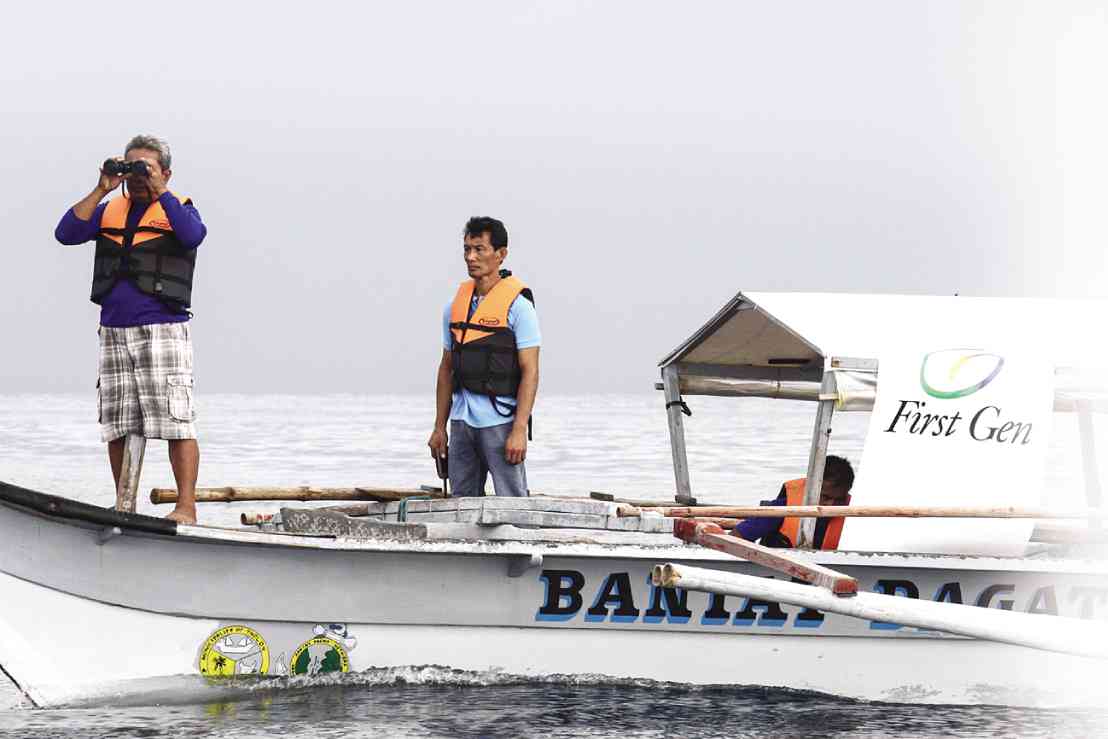Rey Manalo is an active and vocal advocate of the Bantay Dagat (Sea Patrol) program in Mabini, Batangas.
Quite a departure from his younger days when Manalo was a menace to the marine ecosystem of Batangas, being a muro-ami diver.
Now in his 50s, Manalo recalled that, as a muro-ami diver, he would put on a compressor or other breathing devices so he could stay longer underwater.
Once underwater, he’d smash the coral reefs using a heavy pounding device tied to a chain or rope, called seroca or sirusga.
The seroca would drive the fish out of their hiding place and into a waiting net encircling the coral reef. Muro-ami work meant Manalo did not have to wait or look for fish hiding in the coral reefs.
Manalo, however, later realized the destructiveness of muro-ami.
“I noticed that, as the coral reefs vanished, the fish also became scarce,” he said in Filipino.
Worried about the future of the fish from which he draws his livelihood, Manalo vowed to help restore and preserve the coral reefs he once damaged.
He is now chair of the Tingloy chapter of Bantay Dagat, a nationwide network of community-based volunteers who assist government in protecting the marine ecosystem within municipal waters (within 15 kilometers from the shores).
Decades after Manalo gave up his destructive fishing technique, poaching remains a problem, not only in Tingloy but in the whole Verde Island Passage, a busy strait off Batangas, Mindoro, Marinduque and Romblon.
In a bid to address the problem, First Gen Corp., a Lopez Group company, helped initiate a program called Project Center of Center (Project CoC).
First Gen, one of the country’s largest power producers, helped organize Project CoC in response to results of an exhaustive study conducted in 2004 by two respected marine scientists, Dr. Kent Carpenter of the Global Marine Species Assessment and Dr. Springer of the Smithsonian Institution.
In their study, the two marine scientists named the Philippines home to a vast marine ecosystem, the diversity of which surpasses those in Australia and Indonesia. The two scientists also devoted particular attention to the Verde Island Passage, which they described as “the Center of the Center of Marine Shorefish Biodiversity.” They adopted the description after concluding that the Passage hosted the highest concentration of marine species in the world.
But what Manalo observed in Tingloy was also confirmed by the scientists’ study for the whole Passage: Its marine ecosystem is threatened due, among other problems, to unsustainable and destructive fishing practices.
It was for this reason that First Gen helped organize the program to save the marine ecosystem in the Passage.
The program fittingly got its name from the scientists’ description of the Passage: Project Center of Center.
Project CoC’s original scope has several components, including community organizing, research, training and capability building, as well as marine protected area identification.
However, poaching persisted in the Passage due to lack of government resources to enforce the country’s marine laws.
Commercial fishing boats (those weighing more than 3.1 tons) compounded the problem by encroaching into municipal waters in violation of the Philippine Fisheries Code of 1998.
Amid these concerns, First Gen assumed in 2010 the role of direct implementor of Project CoC with focus on marine law enforcement in nine marine protected areas in Mabini, Tingloy and later in Lobo—all coastal towns in Batangas along the Passage.
First Gen supports Project CoC as one way of showing the company’s responsibility as a partner in environmental conservation and protection.
First Gen’s power plants run mainly on clean, renewable and indigenous energy sources.
Its portfolio of power plants includes the 1,000-megawatt Santa Rita and 500-MW San Lorenzo natural gas-fired power plants in Batangas.
Johnny Beloso, chair of Bantay Dagat in Mabini, said that, before help from First Gen arrived, Bantay Dagat volunteers felt helpless while watching poachers operate near the shore.
They wanted to drive away the poachers, but Bantay Dagat patrol boats did not have enough fuel.
This sorry situation changed after First Gen committed logistical support for Bantay Dagat and Project CoC.
Janice Dugan, assistant manager for the Corporate Social Responsibility Group of First Gen, said Bantay Dagat volunteers from the three Batangas towns now get from First Gen a regular supply of gasoline for their pump boats, on top of other logistical support (honorarium, food allowance, cellphones, GPS devices and other equipment, training, legal assistance and even educational subsidy for loved ones).
Aside from Mabini, Tingloy and Lobo, seven other towns and one city compose what is called the Batangas Bantay Dagat Network.
In 2010, these other members of the network also started receiving some support from First Gen as part of a wider campaign against unsustainable fishing practices. Dugan explained that, through the network, First Gen now helps guard 43 declared marine protected areas in Batangas with a total area of 2,072 hectares.
“The network helps, because poachers who escape and get out of our municipal waters are intercepted by other Bantay Dagat volunteers from other Batangas chapters,” said Beloso in Filipino.
This intensified campaign against poaching is paying off, with the marine ecosystem in Batangas regaining its health.
“We catch more fish nowadays,” Beloso said with a smile.
